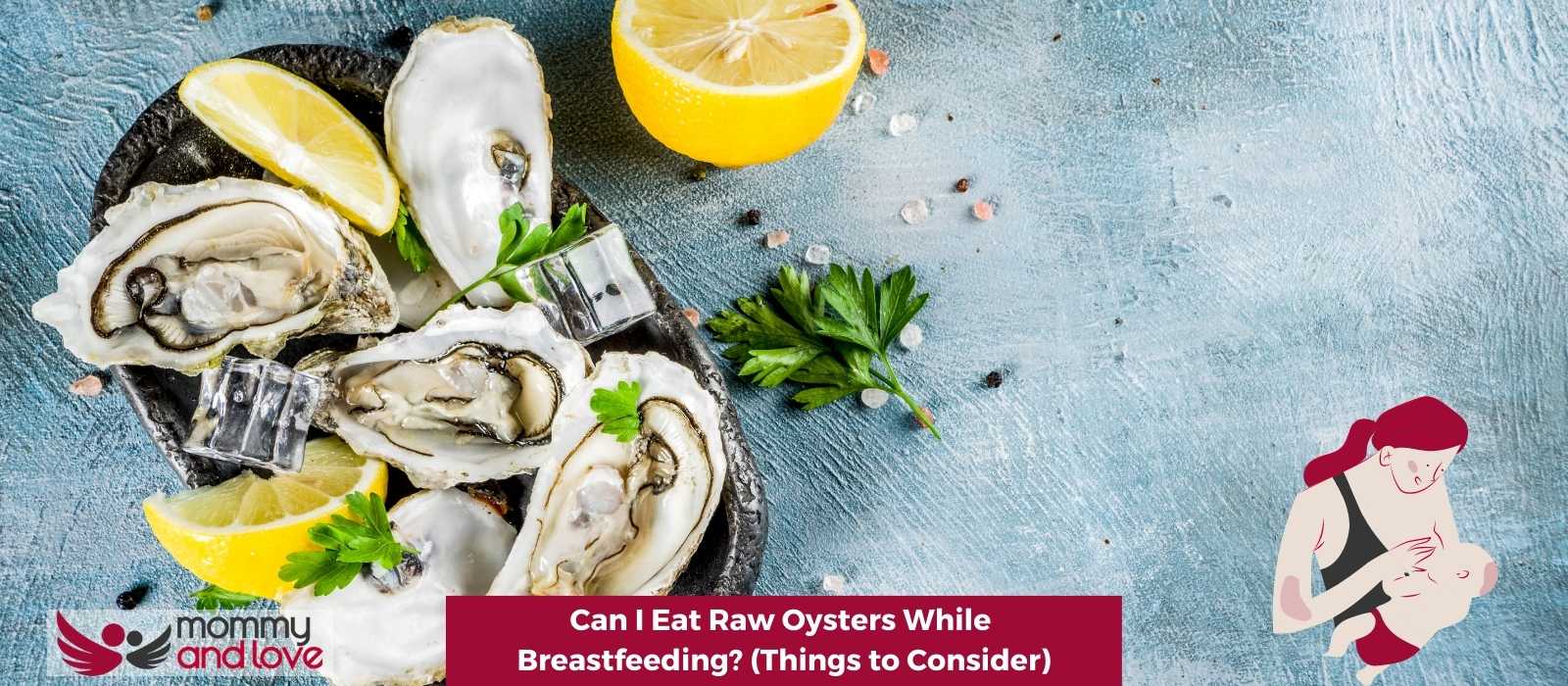Many new mothers are curious about whether or not they can eat raw oysters while breastfeeding. We explore the health benefits and potential risks of eating raw oysters while breastfeeding.
Yes, you can eat raw oysters if you are breastfeeding. However, oysters can contain harmful bacteria, and can be contaminated with heavy metals, such as mercury.
The consumption of raw foods by nursing mothers does not pose a serious problem for breastfeeding infants, although there is always some risk that the mother might catch food poisoning from these sources.
As with any food, it’s important to carefully consider the source of your oysters. If you’re uncertain about whether a particular batch of oysters is safe, it’s best to avoid them altogether.
Affiliate Disclaimer: As an Affiliate, we earn from qualifying purchases.
What Are the Benefits of Eating Raw Oysters While Breastfeeding?
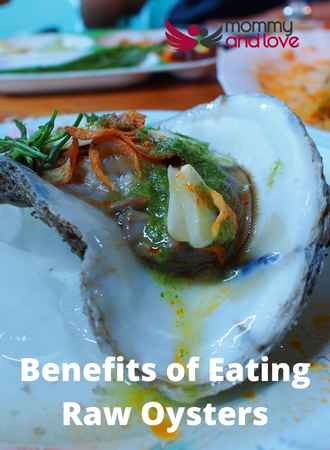
There are many benefits of eating raw oysters while breastfeeding. Oysters are high in nutrients and omega-3 fatty acids, which are important for the development of a baby’s brain and nervous system.
They are also a good source of zinc, which is important for the growth and development of a baby’s skin, hair, and nails. Interestingly, they are low in saturated fat.
Raw oysters are foods that can also help increase the production of breast milk. They are a good source of calcium, which is important for the development of strong bones and teeth.
Eating raw oysters can also help boost your immune system and protect you from illness.
Oysters can be a great source of iron if you’re not getting enough in your breastfeeding diet.
Iron is important for both you and your baby because it helps with brain development and makes sure that your baby has enough energy to grow strong and healthy.
Oysters also contain vitamin B12 which helps to produce red blood cells and DNA. Vitamin B12 is also important for the healthy development of a baby’s nervous system.
What Are the Issues With Eating Raw Oysters?
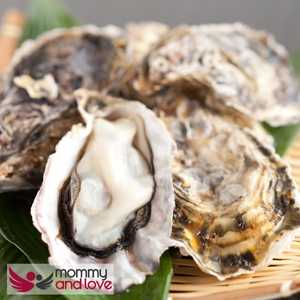
Breastfeeding moms can safely enjoy shellfish like oysters. But there are several potential health risks associated with raw oysters while breastfeeding.
Oysters can contain harmful bacteria, including Vibrio vulnificus and E. coli, that can cause serious illness in both the mother and baby.
Additionally, oysters can be contaminated with heavy metals, such as arsenic and mercury, which can also cause health problems.
You can have a serious problem if you eat shellfish and fish, especially if they are raw or properly cooked.
The majority of Vibrio infections from oysters and other shellfish cause merely diarrhea and vomiting.
Some infections, such as those caused by Vibrio vulnificus, might, however, result in more severe symptoms, such as bloodstream infections and severe blistering skin sores from raw seafood in one’s diet.
The risk of food poisoning is also possible if you eat raw fish or shellfish like oysters. And while organisms that cause food poisoning don’t get into breast milk, it’s always recommended to err on the side of caution.
Are Raw Oysters High in Mercury?

No, oysters are relatively low in mercury when compared to other types of shellfish, but they still contain mercury.
Mercury is a hazardous metal that can harm the body and many shellfish and fish have high mercury content.
When taken in large amounts, it damages the kidneys and neurological system.
How Much Raw Oysters Can I Eat When Breastfeeding?
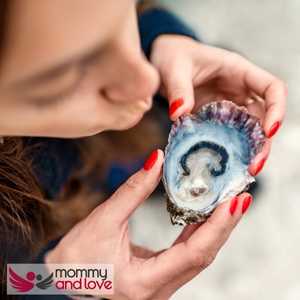
Because of the potential of methylmercury contamination, the FDA recommends limiting your intake of low-methylmercury fish and shellfish to 12 ounces per week if you’re breastfeeding.
Do Raw Oysters Affect Breast Milk Production?
There is no evidence to suggest that raw oysters can affect a mother’s breast milk supply.
However, there is anecdotal evidence from a few nursing moms that they experienced a boost in breast milk production after consuming raw oysters.
Check out our guides to lactating foods that help boost milk supply or alternatively try something like a lactation tea to help.
- Includes Fennel and Fenugreek
- Multiple flavors
- Supports breastmilk production.
- Inspired by a Traditional European Medicine combination passed through generations of women
Do Raw Oysters Affect Breastfeeding?

Yes, raw oysters affect breastfeeding. Oysters are rich in nutrients and omega-3 fatty acids.
After delivery, a mother’s DHA level may stay low because breastfeeding transfers her DHA reserves to the baby’s breast milk.
The need for DHA is crucial for your new infant until he or she is two years old, as brain growth continues during this period.
Oysters are also a good source of protein. It is required for the formation of breast milk, which is then passed from mothers to babies to nourish and support growth.
As a result, breastfeeding women require an extra 25 grams every day. It is critical to consume a variety of protein-rich foods on a daily basis to ensure a continuous supply of milk.
Can A Breastfed Baby Have Food Allergies to Raw Oysters?
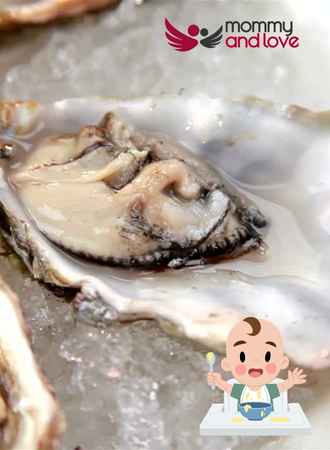
Yes, it is possible for babies to have an allergic reaction to common raw foods like raw oysters, especially if one of the parents has a family history of a food allergy.
Raw oysters pass through breast milk into the baby’s system.
Seafood products especially shellfish like oysters are common allergens.
Oysters are mollusks that belong to the shellfish family. Shellfish allergy is an abnormal immune system response to proteins found in certain seafood such as fish and shellfish.
Crustaceans and mollusks such as shrimp, crab, lobster, squid, oysters, scallops, and others are examples of shellfish.
So be sure to look out for any allergic reactions and symptoms such as rashes, difficulty breathing, diarrhea, swelling and itchiness.
Take Away on Raw Oysters for the Breastfeeding Mother
Raw shellfish can be a healthy addition to your breastfeeding diet, as long as you are aware of the risks and take precautions.
Raw shellfish such as oysters can contain harmful bacteria and contaminants that can make you and your baby sick.
It is important to limit your intake of low-methylmercury fish and shellfish to 12 ounces per week if you’re breastfeeding.
Oysters are also a good seafood source of protein and other vital nutrients that are essential in the diet and health of nursing mothers and their breastfeeding infants.
If you want these nutrients but are uncertain about eating raw shellfish then you can consider other safe fish to eat like eating smoked salmon when you are nursing.
Breastfeeding mothers can eat shellfish like calamari or crawfish as part of a well-balanced diet.
Make sure the raw fish you eat is fresh, and follow the Food and Drug Administration’s (FDA) and Environmental Protection Agency (EPA) seafood recommendations for breastfeeding moms.
Be picky about the seafood you consume and how much of it you eat. And if you want to be sure or have health concerns, talk to your doctor or medical professional.

This article was written by Sandra Baker – full time writer and the mother of four amazing kids (including twins!)
She’s also a breastfeeding counselor and has spent years helping new parents learn how to care for their children. When she’s not writing or caring for her children, Sandra likes to spend time reading and taking walks with her husband.

